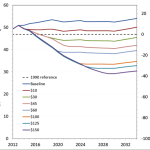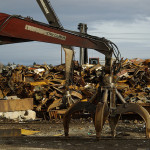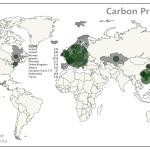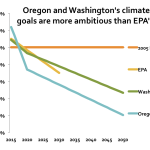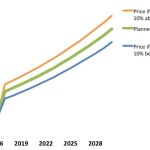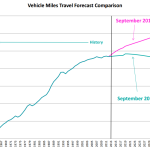Search Results
-
The New Oregon Carbon Tax Report is Out
We are already paying a high price for fossil fuels: strange and severe weather, asthma and cancer cases, a Northwest economy weakened by huge bills for importing coal, oil, and gas, and the political vice grip that Big Oil has on our democracy. Last year, Portland State University (PSU) gave the Oregon legislature a teaser about how to face those problems with a carbon tax. Intrigued by the possibility of holding...Read more » -
Which Way to Clean Industrial Stormwater?
Industrial companies—metal recyclers, printing plants, rail yards, petroleum refineries, and the like—have a smaller footprint on the land compared to residential areas and other businesses. But when rainstorms flush runoff from industrial sites, that contaminated stormwater can carry a toxic cocktail with an outsized impact on lakes, bays, and other sensitive waterways. So the effort to clean up Puget Sound, to make it hospitable to marine life and safe for...Read more » -
All the World’s Carbon Pricing Systems in One Animated Map
Oregon and Washington leaders are contemplating turbocharging their clean energy transition by instituting carbon pricing here in the Pacific Northwest. Will a cap or tax on carbon work? Has anyone else ever done this before? Why, yes. Since you ask: Scandinavian countries have been pricing carbon for more than two decades. The European Union Emissions Trading System (EU ETS) has been pricing carbon for almost a decade. US states and...Read more » -
Indiana Jones and the Clean Power Rule
In Indiana Jones and the Last Crusade, Indie finds himself on a ledge before a chasm, with no obvious way across. Ignoring the evidence of his senses, he follows a clue he’s been given, takes a leap of faith and lands on an invisible plank. The proposed US Clean Power Rule puts Oregon and Washington, along with other Western states, on a ledge, too. Oregon and Washington are on a...Read more » -
A Missed Opportunity for Seattle’s Downtown School
Update: The federal General Services Administration plans to auction off the Federal Reserve Bank building, with an opening bid of $1 million and a closing date of Jan. 28, 2015. The Seattle Public Schools Board of Directors disappointed hundreds of downtown families and residents yesterday by unanimously voting against plans to acquire the vacant Federal Reserve Bank building—at least through a federal disposition process that would let the district have...Read more » -
Toxic Lead’s Home Demolition Loophole
Residential construction is booming again in Seattle and other Northwest cities. To make way for the new, as well as needed increases in density, hundreds of older homes are being demolished every year. However, poor demolition practices—even by “green” builders—and lax regulation are creating an unnecessary hazard from lead-based paint. Removing older or poorly maintained homes from the housing stock can be a good thing, in the long run, to...Read more » -
Four Carbon Cap-Tax Hybrids
A tax and a cap are just different vehicles for delivering the same thing: a carbon price that holds polluters responsible for their pollution, drives the transition to clean energy, andstaves off the worst risks of climate volatility. With a tax, you know the price in advance but not the quantity of carbon pollution per year; with a cap, you know the carbon but not the price. Could Oregon and Washington create a...Read more » -
Washington State Traffic Forecast Finally Recognizes Reality
This is the single most responsible official traffic forecast I’ve seen from any government agency, ever: It’s from a new transportation revenue forecast (pdf link, see p. 27) recently published by the Washington State Office of Financial Management. Their previous forecast, in pink, assumed that traffic would grow endlessly, much as it did during the 1950s through 1990s. But the new forecast, in blue, assumes that the modest traffic growth of the past decade will continue, and...Read more » -
A Fair Share of Streets (Part 2)
In my last post, I took a look at streets that have been designed specifically so kids and cars can safely share space. That’s most definitely not the case on streets like this one, where a seven-year-old Seattle girl last week was critically injured by a car that hit her in a crosswalk, never even braked, and left her lying in the street. A bold experiment in Portland last week...Read more » -
The Big Problem with Letting Small Railroads Haul Oil
The disaster in Lac-Mégantic, Quebec—where 47 people were killed by a Bakken oil train derailment—is commonly understood to have resulted from a train slipping its brakes and then rolling downhill into town where it crashed disastrously. It was a tragedy, but it should not be considered just a mechanical accident. In truth, it was a self-reinforcing chain of events and conditions caused by underinvestment, lack of maintenance, and staff cutbacks....Read more »

